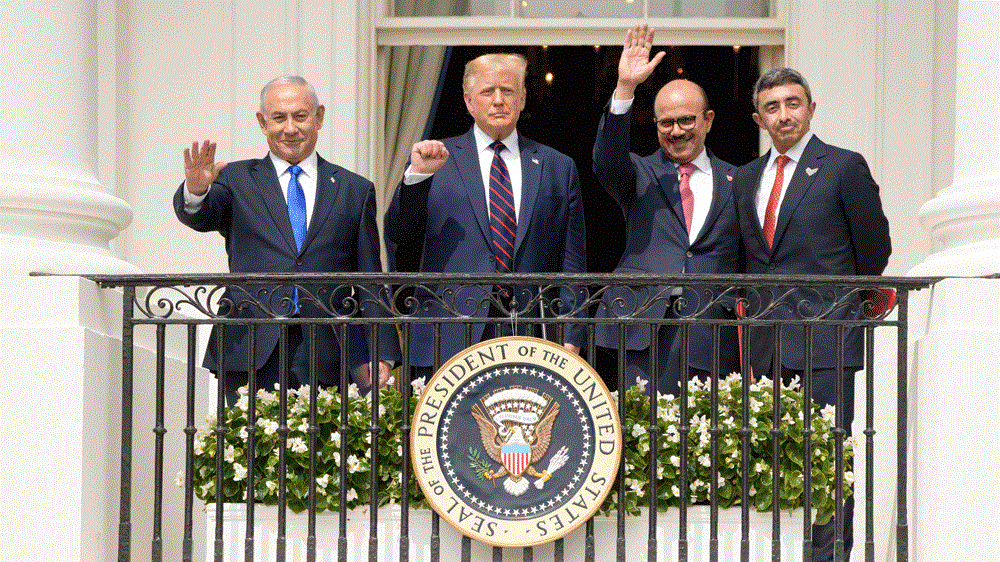

It will take time for the full implications of the Abraham Accords, the historic agreements signed at the White House on 15 September to normalise relations between Israel and the UAE and Bahrain, to sink in.
But it is already clear that all sides are keen to promote the commercial opportunities created by the Accords.
It is impossible to put an accurate value on the scale of those opportunities, but officials are talking things up.
On 16 September, UAE Minister of Economy Abdulla bin Touq al-Marri said the UAE is looking at between $300m-550m-worth of business to come out of the agreement. Israeli officials have been reported as referring to $500m of opportunities.
These numbers seem realistic.
Economic alignment
On paper, the economies of the UAE and Israel complement one another well and the agreements formally identify several potential areas for deals, including aviation, energy, science, technology, healthcare, tourism, agriculture and water.
Israel is strong in sectors such as medicine, desalination, agriculture technology and venture capital, all of which are desired by the UAE as it accelerates its efforts to reduce its exposure to oil.
The UAE, meanwhile, has world-leading expertise in transportation, logistics and land reclamation.
Both countries are investing heavily in conventional and renewable energy. Defence and security cooperation, which has been going on for years in the background, can now develop more openly, such as a reported UAE deal to buy F-35 fighter jets from the US.
The agreements formally identify several potential areas for deals, including aviation, energy, science, technology, healthcare, tourism, agriculture and water
Done deals
Already, several deals have been announced, including:
- Dubai-based DP World is forming a joint venture with Israel Shipyards to bid to operate the Port of Haifa;
- Mohamed bin Zayed University of Artificial Intelligence in Abu Dhabi and Israel’s Weizmann Institute of Science have signed a memorandum of understanding (MoU) to collaborate on artificial intelligence;
- Israeli banks Leumi and Hapoalim have signed MoUs with First Abu Dhabi Bank and Emirates NBD;
- Abu Dhabi Stem Cells Centre has signed an MoU with Pluristem Therapeutics covering regenerative medicine;
- Abu Dhabi-based Group 42 is establishing a wholly owned subsidiary in Israel, after previously announcing a plan to collaborate with Israel’s NanoScent on developing a new test for Covid-19;
- The UAE’s Apex National Investment has also signed an agreement with Israel’s TeraGroup to conduct research on Covid-19.
Critics of the deals say the UAE and Bahrain are allowing themselves to be used as public relations opportunities for the embattled leaders of Israel and the US, both of whom face difficult elections this year.
Others point to the failure of Israel’s previous deals with Egypt and Jordan to produce any meaningful economic cooperation.
But the Abraham Accords are not the same as the previous agreements.
Strategic purpose
For one thing, while the agreements significantly shift the sands of the region’s political landscape, they are not genuine peace deals in the traditional sense. There was no war between the UAE and Israel, or between Bahrain and Israel.
But as the US disengages from the region, and tensions between Arab states and Iran grow, the Gulf states, including Saudi Arabia, must find new ways to ensure their security.
Normalising relations with Israel makes sense for them in this regard, although it risks opening new fault lines across the Arab world over the Palestinian issue.
And while there is no doubt the agreements suit the domestic political needs of Donald Trump and Benjamin Netanyahu, they also make real economic sense for the UAE and Bahrain.
The Gulf states are facing severe economic disruption as a result of the Covid-19 pandemic, and ‘doing things differently’ is a vital element of the boosting the recovery.
> Israel move was a question of timing
> Israel deal confirms UAE's focus on the future
> Bahrain to normalise relations with Israel
> UAE abolishes Israel boycott law
> UAE and Israel establish direct phone links
> DP World to bid for Israeli port privatisation
> Region reacts to UAE normalising Israel relations
> Saudi foreign policy weathers changing world order

Bahraini Minister for Foreign Affairs Abdullatif bin Rashid al-Zayani (left) and UAE Minister of Foreign Affairs & International Co-operation Abdullah bin Zayed al-Nahyan (right) attend the Abraham Accords ceremony at the White House
You might also like...

Egypt strengthens its economic position
04 March 2026

Kezad signs land lease deal with Galadari Brothers
04 March 2026
A MEED Subscription...
Subscribe or upgrade your current MEED.com package to support your strategic planning with the MENA region’s best source of business information. Proceed to our online shop below to find out more about the features in each package.
Take advantage of our introductory offers below for new subscribers and purchase your access today! If you are an existing client, please reach out to your account manager.













